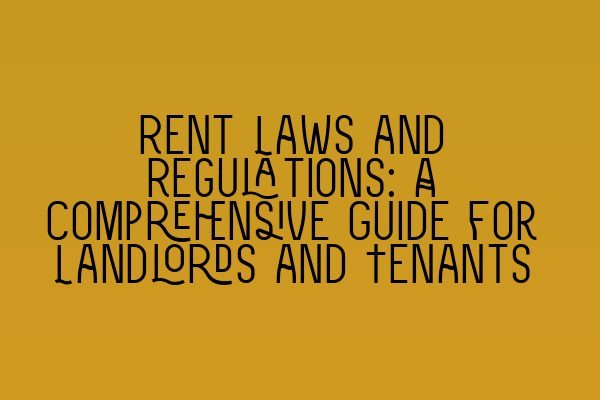Rent Laws and Regulations: A Comprehensive Guide for Landlords and Tenants
As a landlord or tenant, it is crucial to have a thorough understanding of the rent laws and regulations that govern the rental market. These laws are designed to protect the rights of both parties and ensure fair and equitable tenancy agreements. Whether you are a new landlord looking to navigate the complexities of renting out a property or a tenant seeking to understand your rights and responsibilities, this comprehensive guide will provide you with the essential information you need to know.
1. Know Your Legal Responsibilities
Landlords and tenants both have legal responsibilities that must be adhered to. As a landlord, you have the responsibility to ensure the property is safe and habitable for your tenants. This includes providing necessary repairs, maintaining common areas, and complying with health and safety regulations. Tenants, on the other hand, have the responsibility to pay rent on time, keep the property clean, and report any maintenance issues promptly.
For a detailed understanding of your legal responsibilities as a landlord or tenant, you can refer to this SQE 1 Practice Mocks FLK1 FLK2 article.
2. Understanding Rent Increases
Rent increases are regulated by laws and regulations to ensure fairness and prevent excessive increases. Landlords must follow specific procedures to increase rent, including providing proper notice to tenants and adhering to any rent control laws in your jurisdiction. Tenants have the right to challenge unreasonable rent increases, and there are mechanisms in place to resolve disputes amicably.
If you want to learn more about rent increases and the steps involved, check out this informative article on SRA SQE Exam Dates.
3. Security Deposits
Security deposits are often required by landlords as a form of protection against property damage or unpaid rent. However, there are regulations governing the collection, use, and return of security deposits. Landlords must hold security deposits in a designated account and provide tenants with an itemized list of deductions, if applicable, within a specific timeframe. Tenants have the right to dispute any improper deductions and seek the return of their deposit.
If you are interested in learning more about security deposits and how they should be handled, this SQE 1 Practice Exam Questions article will provide useful insights.
4. Eviction Process
In unfortunate circumstances where eviction becomes necessary, it is essential to follow the proper legal procedures. Both landlords and tenants have rights during the eviction process. Landlords must provide proper notice and follow the legal requirements for eviction, while tenants have the opportunity to defend their case in court if they believe the eviction to be unjust.
For a detailed understanding of the eviction process for both landlords and tenants, you can refer to this informative article on SQE 1 Preparation Courses.
5. Seeking Legal Assistance
Rent laws and regulations can often be complex, and it is advisable to seek legal assistance when dealing with significant issues or disputes. Legal professionals specializing in property law have the expertise to provide guidance, ensure compliance with the law, and represent your interests in court, if necessary.
If you require assistance with rent laws and regulations, SQE Property Law & Land Law offers comprehensive legal services, including consultation and representation. Visit their website to learn more about their SQE 2 Preparation Courses.
Conclusion
By understanding the rent laws and regulations that govern the relationship between landlords and tenants, you can ensure a smoother and more harmonious renting experience. Both parties have rights and responsibilities, and it is essential to educate yourself on the legal framework that safeguards these interests. If you need further assistance or guidance, do not hesitate to consult with legal professionals specializing in property law.
